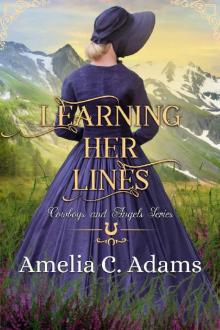- Home
- Amelia C. Adams
Test of Time (Nurses of New York Book 5) Page 2
Test of Time (Nurses of New York Book 5) Read online
Page 2
He shifted uncomfortably on the seat. “I don’t see how you came up with that ridiculous notion.”
Jeanette shook her head, wondering how he had missed it. “She lives all alone, she dresses up for your visits, she perks right up when you come in the room—I know the signs of a woman in love, Dr. Swenson. Of course, I should ask if there’s a Mrs. Swenson before I keep embarrassing you like this.”
His ears were definitely red, and Jeanette didn’t think it was from the cold. “There is no Mrs. Swenson.”
“Well, I think it wouldn’t do any harm to pay Mrs. Fitzpatrick a social call. Perhaps a game of chess?”
He mumbled something into his coat collar.
“I’m just making a suggestion. You can take from it what you will.” Jeanette turned away to hide her persistent smile at his discomfort.
The next house was vastly more humble. They had literally gone from a mansion to a cottage, and Jeanette felt much more comfortable at the cottage. In this home lived a mother and daughter, Mrs. and Miss Brimley, a spinster taking care of her elderly parent.
“We don’t have much hope for Mrs. Brimley to live out the week,” Dr. Swenson said as he tied up the horses outside. “Her daughter is wearing herself out seeing to her every need, and I worry about her health as well.”
When they entered the home, Jeanette was immediately struck by how clean it was. Not just tidy—scrubbed over and over again until everything was worn smooth. Mrs. Brimley lay in a bedroom just opposite the front door, and Miss Brimley spoke to the doctor in worried tones as Jeanette took the patient’s pulse.
“She’s stopped eating, Doctor. I tried dribbling some weak broth into her mouth last night, but she turned her head away. And she hasn’t woken up yet today. I’ve spoken to her and rubbed her hands, and she doesn’t respond to anything.”
“This is one of the signs we discussed, Tabitha,” Dr. Swenson said gently. “Her body is shutting down slowly. Chances are that she won’t wake up again.”
Jeanette noticed how thin and wrinkled her patient’s hands were, like they’d been created from decade-old paper. Her face was white, almost a holy white, as though she was an angel instead of a mortal being on the earth. Or perhaps a doll or a statue, but the rise and fall of her chest showed that she was real and not a carving.
“And so what happens next?” Miss Brimley asked, her voice sounding very small.
“Chances are that she’ll just slip away peacefully in the next day or two. It’s good that she’s sleeping—it means that she’s not suffering.”
Miss Brimley wiped tears away with the back of her hand. “I’m glad of that.”
“Yes, I’m sure we all are.” Dr. Swenson looked over at the bed, but didn’t take a step toward it. “I could examine her, but at this point, I wouldn’t learn anything new. It’s quite obvious that she has entered those final phases.”
Miss Brimley nodded. “I understand.”
Jeanette came to the woman’s side. “Do you have any other family nearby?”
“No, it was just me and Mother. And now . . . now it will just be me.” Miss Brimley’s shoulders began to heave, and Jeanette steered her toward a chair. What would it be like to lose your only parent with no other family to lean on? Jeanette had always relied on Abigail, her sister. They had overcome more than their fair share of dark moments together. Miss Brimley would have no one.
“Dr. Swenson, may I speak with you for a moment?” Jeanette said, leaving Miss Brimley’s side and stepping to the corner of the main room. He followed her, a curious look on his face.
“Doctor, may I please stay with Miss Brimley until her mother passes? She’ll be all alone otherwise, and you did mention that you were worried about her wellbeing.”
Dr. Swenson frowned. “You realize it’s not standard practice for us to sit with a patient for an indeterminate amount of time, especially when there’s really nothing more we can do.”
Jeanette nodded. “I do understand, sir. But in this case, where your other patients aren’t exhibiting urgent needs and Miss Brimley is obviously exhausted, I’d like to stay.” She couldn’t explain the nudge she felt to remain exactly where she was. All she knew was that leaving this home felt wrong.
He didn’t reply for a moment, but then he nodded. “Very well. We could consider this part of your training in end-of-life care. If Dr. Russell speaks to me about it, though, I will be certain to tell him just whose idea it was.”
Relief filled Jeanette’s soul. “I’ll tell him myself, sir. Thank you so much.”
Dr. Swenson nodded. “Very well. Send someone for me when the event occurs.” He bade Miss Brimley good day, and then he left.
“You’re going to stay with me?” Miss Brimley asked as she wiped away another batch of tears.
“That’s right. Now, tell me. When was the last time you had something hot to eat?”
Chapter Three
There was already a loaf of bread on the counter, so that was a start. Jeanette found a few eggs and scrambled them, adding in some ham scraps and a little salt. Then she urged Miss Brimley to sit down and eat, placing a hot mug of chamomile tea next to the plate.
“Now, Miss Brimley, a few things. First off, please call me Jeanette. It just saves so much time.”
The other woman smiled. “All right. And you must call me Tabitha.”
“Done. And the second thing is that once you’ve eaten, I want you to take a nap.”
Tabitha immediately faltered. “I don’t see how I could, with Mother—”
Jeanette put her hand on Tabitha’s shoulder. “You’re exhausted. You’ll do no one any good if you wear yourself out. Get some sleep, I’ll take care of things, and I’ll wake you if there are any changes.”
Tabitha opened and closed her mouth a few times as though she was about to argue, but then she nodded. “You’re right—I’m exhausted. Thank you.” She rose halfway and then paused, leaning on the table with both hands. “You’ll wake me?”
“I’ll absolutely wake you.”
Tabitha nodded again, then stumbled to another bedroom on the other side of the kitchen and closed the door.
Jeanette checked on Mrs. Brimley, then went back into the kitchen to clean up from the meal. She didn’t know if Tabitha was always such a fastidious housekeeper or if she was using cleaning as a way to expend her nervous energy, but she made sure to leave the room just as clean as it was when she’d begun cooking. Then she sat in the chair near Mrs. Brimley’s bedside and studied the old woman’s face.
It was relaxed, as though she merely slept, and she wore just the faintest of smiles. Jeanette couldn’t help but smile herself. What was the woman dreaming about? Was she already visiting that realm where her soul would go when she finally did depart?
Knowing there was nothing she could do but lend her presence, Jeanette reached into her pocket and pulled out Phillip’s last three letters. She’d taken to carrying little bits of him with her throughout the day—she liked to pretend that somehow, that made him literally closer to her as well.
The oldest of the three had been sent at Thanksgiving.
Dearest Jeanette,
Autumn has been beautiful in Kansas this year. I notice things like that more than I ever did before because I find myself wanting to share it all with you. I think, I wonder if Jeanette would like that red-leafed tree or that blue, blue sky or that bit of a nip in the air. You’ve opened my eyes to appreciating the things around me, all the things that a grumpy old bachelor is prone to miss until a beautiful young woman comes along to show him what he’s been missing.
I was called in to help deliver triplets last night. That was certainly an occasion, and what made it all the more memorable is that all three babies are doing remarkably well. Generally speaking, in a case like this, one (if not more) of the babies will be sickly and pass before it’s even had a chance. However, by the time I left this morning, all three babies were pink and warm and sleeping comfortably. You can imagine I took a nice long nap befor
e I tried to start my day.
I don’t know if you remember Mrs. DeFoe. She had another fall last week, and broke her ankle. She’s been told to stay down, but she already got her husband to fashion her a pair of crutches and she’s trying to do all her regular chores. I scolded her, but it did no good. You know how some patients are.
Oh, Jeanette. I’m counting down the days until you get home. Until then, I rest assured knowing that you’re being well cared for and that you’re enjoying your experiences. You sound healthy and happy, and that’s what I want most for you.
Until the end of January,
Phillip
She loved it when he included tidbits of his day and talked about his patients. That made her feel as though she wasn’t missing out on everything in his life. She could imagine being there with him, assisting him.
The next letter didn’t arrive until nearly Christmas, which was odd because she’d been receiving mail every week to that point.
Dear Jeanette,
It’s been bitter cold here, sometimes with snow and sometimes not. When we’ve had snow, the drifts have been almost insurmountable, and it’s been difficult to get out to see my patients. My carriage has gotten stuck several times.
Everyone in town is getting ready for Christmas. I’m sure Mr. Appleby loves this time of year and all the business his store gets.
I’m sorry—I was up all night with a patient with a high fever, and I need to lie down. I just wanted to jot you a note and wish you well at this holiday season.
Phillip
She supposed that letter was all right, even though it was so short, she wasn’t sure she would have wasted the postage on it. It was the third one, the one that had arrived just the week before, which had her the most concerned. Again, there had been a long gap between letters.
Jeanette,
It’s certainly been a busy holiday season around here. I’ve been called in on several complicated births, two broken legs as people have forgotten how to walk on ice—or how to avoid it altogether—and one broken nose. That happened during a fistfight at one of the saloons. You know how much I love attending to saloon injuries.
Something interesting happened this last week. Do you recall my mentioning a woman named Alexandra Evans? She and I were once good friends back when I was attending medical school. She was studying art, and we met while I was visiting a museum one afternoon. We fell to talking, and then we made arrangements to visit different exhibits together. Her friendship helped me feel less out of place in New York.
Well, she’s just moved to Topeka. Imagine my surprise to see her again after all this time. She married, as I always supposed she would, but she was widowed at a young age and is now alone. She came to town to find her cousin, and they plan to start up a millinery shop. I was so surprised to see her. She hasn’t changed at all.
Oh, someone’s at the door needing a doctor. I’ll write again soon.
Phillip
Jeanette had looked for a follow-up letter all week, but none had arrived. Again, why had he mailed it when it was incomplete? She always tried to pack everything she could into her letters, but then, she was living on a poor student’s allowance and he did have more leeway with his spending. Maybe he could afford to dash off a few lines and send them across the country whenever he wanted.
But why hadn’t he wanted to write her more frequently, and why had Alexandra Evans suddenly popped up in town? The timing of that seemed uncanny, as though it had been brought about by the hand of an unkind providence just as Jeanette was getting ready to come home. But no, she didn’t believe that providence was unkind. Sometimes bad things just happened.
And it would take a lot of convincing for her not to believe that Alexandra Evans was a bad thing.
***
There was no change at all in Mrs. Brimley for the next four hours, so Jeanette let Tabitha sleep. Toward evening, she invaded the kitchen again and pulled together a soup to simmer over the fire, then set to work on a new batch of bread. There was something about watching the yeast rise to the top of the water and blossom that relaxed her, and definitely something about pounding out her frustrations into the dough as she kneaded it that helped her work out her emotions. By the time Tabitha emerged from her room, the dough was on its second rising, the kitchen was spotless again, and Jeanette was feeling much better.
“How did you sleep?” she asked as Tabitha crept into her mother’s room.
“At first, I didn’t think I’d be able to sleep at all, but then I heard you humming to Mother, and I knew she was in good hands. I drifted off right afterwards.”
Jeanette shook her head. “I wasn’t humming, Tabitha.”
“Are you sure? It was coming from in here, and I thought for sure it was you. Who else could it have been?”
“I have no idea. Maybe you were so tired, you dreamed it.” Jeanette stood up and motioned for Tabitha to lead the way into the kitchen. “Sit down and have something to eat. The bread is still rising—I should have started it sooner, I admit—but we’ll have hot bread and butter for a bedtime snack later.”
The soup turned out all right, if a little bland because Jeanette hadn’t been able to find any onions. Then she sent Tabitha in to be with her mother while she cleaned up. She’d give the woman all the time she needed to say good-bye, and wondered what life would mean once she was on her own. Tabitha had to be in her mid-forties—did she have an income? Any way to support herself or to become trained in a profession? She’d have to ask Dr. Swenson, even if he did say it wasn’t their usual standard of practice to interfere with things like that.
After a quick glance around, she found some stationery and a pen in a drawer, and asked if she might use some. Tabitha didn’t mind, so Jeanette carried the writing materials over to the table and sat down, deciding to use this time to write to Phillip. She’d sent him a letter just four days before, but felt an urgency to do it again.
Dear Phillip,
When we’re married, we will always have onions in our house, all right?
School has been quiet this week, but busy. We’ve been reviewing nearly everything we’ve learned since we arrived—Mrs. Russell says she’s putting together a challenging final exam for us. I’ve never excelled at taking written tests, so I’ve been nervous thinking about that. I’ve probably spent a lot more time studying than I’ve really needed to, but this is important to me. I want to be as useful to you in your career as possible, and you need a knowledgeable nurse.
She paused, wondering if she should say what was on her mind. Maybe if she ignored it, it would just go away . . . unlikely. Very unlikely. If she wanted him to know how she felt, she’d need to say it. Playing guessing games would never do.
I haven’t heard from you since you wrote about Alexandra Evans. I trust she’s settling into town well. I hope you aren’t spending all your free time reminiscing about the good old days in New York and that you’re managing to stay on top of your patient load.
There. That should be enough of a hint without knocking him over the head with it, right?
I received a letter from Abigail the other day. She and Gabe are adding on to their house, putting a new bedroom on the west side. It took me a few minutes to understand what she was trying to tell me—I wasn’t reading between the lines like I should have been—but when I finally understood, I was so happy for her. I don’t know why she felt the need to hint about it, though. I’m a nurse, or at least, I will be very soon. Things like that are no mystery to me. I can hardly wait to meet this little niece or nephew, whatever it turns out to be.
I’m currently sitting with a patient who seems to be advancing toward death. She has entered the sleeping stage and is quite peaceful. Her breathing has become light and unlabored, and she wears a little smile on her face. When I pass, I hope I can be just as serene about it.
Jeanette thought for another minute, then decided to finish the letter when she got back to her room. She put away the paper and the pen, then went in to see ho
w Tabitha and her mother were doing.
Mrs. Brimley’s chest now fluttered ever so slightly.
“I believe it will be soon,” Jeanette said, placing her hand on Tabitha’s shoulder. “See how quietly she’s sleeping? She will slip away peacefully, which is a blessing.”
“I know it is. I just wish . . .” Tabitha wiped her eyes. “I wish I had been a better daughter, that I’d told her how much I loved her, that I’d listened to her more.”
Jeanette couldn’t imagine Tabitha being anywhere near as rebellious as she was making herself out to be. The worst sin this meek woman could possibly commit would be something like using too much sugar in her tea. “I believe she can hear you,” she said gently. “Why don’t you talk to her?”
“Out loud?” Tabitha seemed surprised.
“Of course out loud. She isn’t gone—she’s right here. Speak to her as though she were wide awake.”
Tabitha moved to her mother’s side and took her hand, so limp and frail. “Mother, it’s me, Tabitha. I . . . I just want you to know that I love you. And that I’m sorry I wasn’t kinder to Mr. Peterman when he wanted to marry you. I shouldn’t have chased him off. And I’ll apologize to him next time I see him.”
Ah, a little thwarted romance in the family history, eh?
“I hope you’ll be very happy in heaven, and I hope that you’ll look down on me from time to time.” Tabitha paused, but seemed to have run out of words, so she laid her mother’s hand back down on the blanket ever so gently and turned away. Then she stopped. “Are you sure you’re not humming, Jeanette?”
“I’m positive,” Jeanette replied, a chill creeping down her neck. “What do you hear?”
Tabitha turned toward the window. “It’s a lullaby my grandmother used to sing. I don’t remember the words—just the tune. It’s coming from over here.” She pulled back the curtain, and beams of winter moonlight poured into the room. “Can’t you hear it?”

 Honoring Her Heart
Honoring Her Heart Buttons and Bows
Buttons and Bows An Agent for Emily
An Agent for Emily Christmas Catch-Up VIII (River's End Ranch)
Christmas Catch-Up VIII (River's End Ranch) A Rancher for Rowena
A Rancher for Rowena Candice (Seven Sisters Book 6)
Candice (Seven Sisters Book 6) Butterfly Kisses
Butterfly Kisses A Stitch in Time
A Stitch in Time Buttons and Bows (The Sewing Circle Book 3)
Buttons and Bows (The Sewing Circle Book 3) Sidearms and Songbirds (Hearts of Nashville Book 3)
Sidearms and Songbirds (Hearts of Nashville Book 3) Herd to Breathe
Herd to Breathe The Ties That Bind
The Ties That Bind Rhyme or Reason
Rhyme or Reason Revelations (Brody Hotel Book 4)
Revelations (Brody Hotel Book 4) Phoebe's Fate (Burnt River Contemporary Western Romance Book 9)
Phoebe's Fate (Burnt River Contemporary Western Romance Book 9) And Something Blue (Main Street Merchants Book 1)
And Something Blue (Main Street Merchants Book 1) Learning Her Lines
Learning Her Lines Connections
Connections The Turn of a Wheel (Kansas Crossroads Book 17)
The Turn of a Wheel (Kansas Crossroads Book 17) Just Desserts (Main Street Merchants Book 4)
Just Desserts (Main Street Merchants Book 4) An Agent for Anna
An Agent for Anna An Agent for Esme
An Agent for Esme A Handyman for Helen
A Handyman for Helen Scented Sensibility
Scented Sensibility Addie's Adventurer
Addie's Adventurer Defying the Darkness
Defying the Darkness Riding the Rails
Riding the Rails Sugar And Spice (Main Street Merchants Book 7)
Sugar And Spice (Main Street Merchants Book 7) An Agent for Cynthia
An Agent for Cynthia In The Stars (Main Street Merchants Book 6)
In The Stars (Main Street Merchants Book 6) Moonlight With Alice (The Matchmaker's Ball Book 3)
Moonlight With Alice (The Matchmaker's Ball Book 3) Five Golden Rings (Main Street Merchants Book 3)
Five Golden Rings (Main Street Merchants Book 3) Between The Lines (Main Street Merchants Book 5)
Between The Lines (Main Street Merchants Book 5) An Agent for Lucy
An Agent for Lucy Jessica (Seven Sisters Book 2)
Jessica (Seven Sisters Book 2) A Passing Glance
A Passing Glance Pet Peeves
Pet Peeves RNWMP: Bride for Joel
RNWMP: Bride for Joel Bowing to Betsy (The Matchmaker's Ball Book 11)
Bowing to Betsy (The Matchmaker's Ball Book 11) Rebekah (Seven Sisters Book 4)
Rebekah (Seven Sisters Book 4) A Joyful Noise (Kansas Crossroads Book 14)
A Joyful Noise (Kansas Crossroads Book 14) Her Second Chance Hometown Groom
Her Second Chance Hometown Groom A Christmas Promise (Kansas Crossroads Book 16)
A Christmas Promise (Kansas Crossroads Book 16) Bride for Samuel
Bride for Samuel Bribing the Blacksmith (Cowboys and Angels Book 9)
Bribing the Blacksmith (Cowboys and Angels Book 9) RNWMP: Bride for Samuel (Mail Order Mounties Book 12)
RNWMP: Bride for Samuel (Mail Order Mounties Book 12) Tea for Two
Tea for Two The Bitter and the Sweet (Kansas Crossroads Book 9)
The Bitter and the Sweet (Kansas Crossroads Book 9) Frank (Seven Sons Book 6)
Frank (Seven Sons Book 6) A Cattleman for Cora
A Cattleman for Cora Paislee's Path (River's End Ranch Book 48)
Paislee's Path (River's End Ranch Book 48) Accidental Agent (River's End Ranch Book 3)
Accidental Agent (River's End Ranch Book 3) Test of Time (Nurses of New York Book 5)
Test of Time (Nurses of New York Book 5) RNWMP: Bride for Michael (Mail Order Mounties Book 24)
RNWMP: Bride for Michael (Mail Order Mounties Book 24) Loving the Landlord
Loving the Landlord The Dark and the Dawn (Kansas Crossroads Book 3)
The Dark and the Dawn (Kansas Crossroads Book 3) Candy Crush
Candy Crush Tabitha: Bride of Missouri (American Mail-Order Bride 24)
Tabitha: Bride of Missouri (American Mail-Order Bride 24) Touch of Tenderness (Nurses of New York Book 3)
Touch of Tenderness (Nurses of New York Book 3) Lucky Lifeguard (River's End Ranch Book 28)
Lucky Lifeguard (River's End Ranch Book 28) Heartstrings (Brody Hotel Book 2)
Heartstrings (Brody Hotel Book 2) Heart of Hearts (Nurses of New York Book 4)
Heart of Hearts (Nurses of New York Book 4) Hope_Bride of New Jersey
Hope_Bride of New Jersey A Careless Wind (Kansas Crossroads Book 7)
A Careless Wind (Kansas Crossroads Book 7) An Agent for Emily (The Pinkerton Matchmaker Book 28)
An Agent for Emily (The Pinkerton Matchmaker Book 28) A Twisted Fate
A Twisted Fate Delivering Destiny (River's End Ranch Book 23)
Delivering Destiny (River's End Ranch Book 23) Tabitha_Bride of Missouri
Tabitha_Bride of Missouri A Wrangler for Wynonna
A Wrangler for Wynonna RNWMP_Bride for Peter
RNWMP_Bride for Peter An Unspoken Dream (Kansas Crossroads Book 13)
An Unspoken Dream (Kansas Crossroads Book 13) Generations
Generations Utah Sunrise (Rocky Mountain Romances Book 1)
Utah Sunrise (Rocky Mountain Romances Book 1) Bride for Jonathan
Bride for Jonathan Bribing the Blacksmith
Bribing the Blacksmith A Clean Slate (Kansas Crossroads Book 4)
A Clean Slate (Kansas Crossroads Book 4) Hope: Bride of New Jersey (American Mail-Order Brides 3)
Hope: Bride of New Jersey (American Mail-Order Brides 3) Rugged Rockclimber (River's End Ranch Book 8)
Rugged Rockclimber (River's End Ranch Book 8) RNWMP_Bride for Michael
RNWMP_Bride for Michael RNWMP: Bride for Joel (Mail Order Mounties Book 4)
RNWMP: Bride for Joel (Mail Order Mounties Book 4) Tea For Two (Cowboys & Angels Book 15)
Tea For Two (Cowboys & Angels Book 15) Sweet Georgia Peach
Sweet Georgia Peach RNWMP: Bride for Peter (Mail Order Mounties Book 20)
RNWMP: Bride for Peter (Mail Order Mounties Book 20) A Clear Hope (Kansas Crossroads Book 5)
A Clear Hope (Kansas Crossroads Book 5) Meredith's Mistake (Grandma's Wedding Quilts Book 4)
Meredith's Mistake (Grandma's Wedding Quilts Book 4) RNWMP_Bride for Samuel
RNWMP_Bride for Samuel The Whisper of Morning (Kansas Crossroads Book 6)
The Whisper of Morning (Kansas Crossroads Book 6) RNWMP: Bride for Jonathan (Mail Order Mounties Book 8)
RNWMP: Bride for Jonathan (Mail Order Mounties Book 8) Santa's Shopkeeper (River's End Ranch Book 18)
Santa's Shopkeeper (River's End Ranch Book 18) A Broken Wing (Kansas Crossroads)
A Broken Wing (Kansas Crossroads) Cause of Conflict (Nurses of New York Book 2)
Cause of Conflict (Nurses of New York Book 2) A Free Heart
A Free Heart A New Beginning
A New Beginning The Calm of Night (Kansas Crossroads Book 10)
The Calm of Night (Kansas Crossroads Book 10) Bride for Calvin
Bride for Calvin Sea of Strangers (Nurses of New York Book 1)
Sea of Strangers (Nurses of New York Book 1)